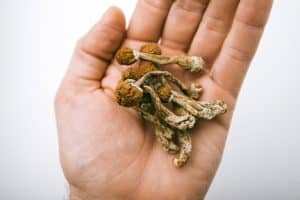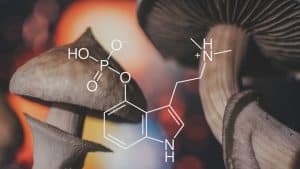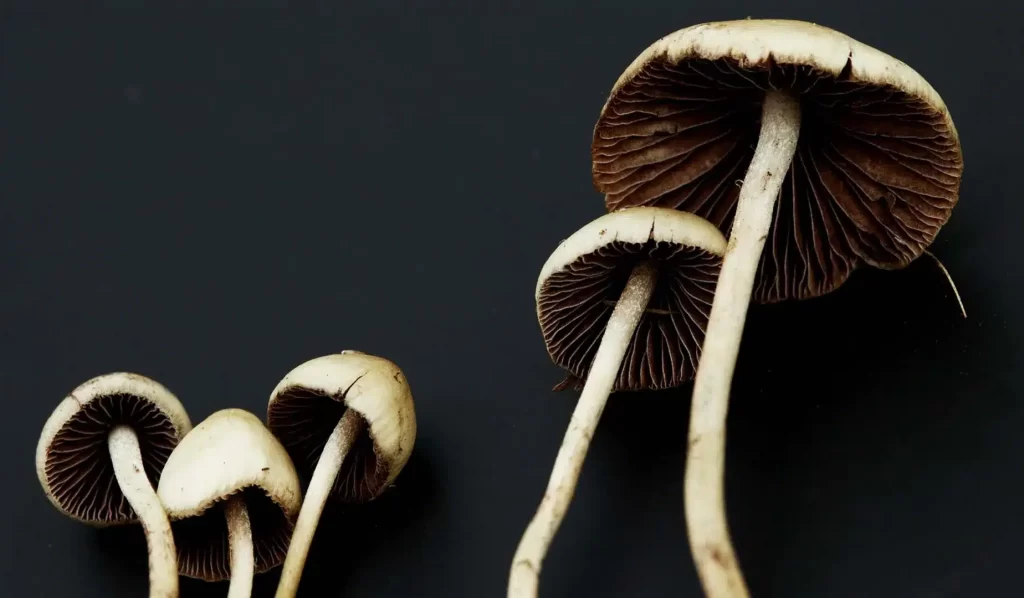Blog
From Recreational Use to Addiction Treatment: Unveiling the Magic of Psilocybin for Substance Use Disorders
Magic mushrooms, also known as psilocybin mushrooms, have been used for centuries in various cultures for their psychoactive properties. In recent years, research into the potential therapeutic benefits of magic mushrooms has gained momentum, particularly in the field of addiction treatment. While these fungi are still classified as Schedule I substances in many countries, the growing body of scientific evidence suggests that psilocybin-assisted therapy could be a game-changer in helping individuals break free from the shackles of addiction. In this magazine-style blog, we delve into the journey of magic mushrooms, from recreational use to their potential as a revolutionary tool in addiction recovery.
Unveiling the Magic of Psilocybin


Psilocybin, the primary psychoactive compound found in magic mushrooms, has captivated human curiosity for centuries. From ancient rituals to modern scientific exploration, psilocybin’s effects on the human mind and its potential therapeutic applications have been subjects of fascination. This section delves into the chemical intricacies of psilocybin, uncovering its history and impact on brain function. Indigenous cultures across the globe have revered magic mushrooms for their mystical properties, often using them in spiritual ceremonies to gain insight and connect with the divine. Today, with advancements in neuroscience and pharmacology, researchers are unlocking the mechanisms behind psilocybin’s mind-altering effects. Studies have revealed that psilocybin interacts with serotonin receptors in the brain, leading to altered states of consciousness and profound perceptual experiences.
Beyond its mystical allure, the potential therapeutic applications of psilocybin are garnering significant attention. Recent clinical trials have shown promising results in using psilocybin-assisted therapy for various mental health conditions, including depression, anxiety, and post-traumatic stress disorder (PTSD). The compound’s ability to create a state of increased emotional openness and introspection, paired with therapeutic support, may allow individuals to address underlying psychological issues and find resolution.
The journey of psilocybin from recreational use to a therapeutic tool has not been without its challenges. Due to its classification as a Schedule, I substance in many countries, conducting research has been restricted for decades. The resurgence of interest in psychedelic research, combined with public advocacy for policy reform, has begun to pave the way for more extensive studies on psilocybin’s potential benefits and risks.
As we unravel the magic of psilocybin, it becomes clear that there is much more to learn about this fascinating compound and its therapeutic potential. By understanding its effects on brain function and exploring its historical significance, we open the door to a new era of research and medical understanding. As researchers and medical professionals continue to explore psilocybin’s potential applications, it is crucial to approach the subject with scientific rigor, ethical considerations, and a commitment to uncovering its true healing capabilities. Only through careful study and open dialogue can we fully unveil the magic of psilocybin and its transformative possibilities in mental health care.
Psilocybin-Assisted Therapy


In recent years, psilocybin-assisted therapy has emerged as a potential game-changer in the field of addiction treatment. This unique approach involves the controlled administration of psilocybin, the psychoactive compound found in magic mushrooms, in a therapeutic setting to help individuals overcome Substance Use Disorders. As we delve into the groundbreaking studies and clinical trials surrounding this therapy, a growing body of evidence suggests that psilocybin-assisted therapy holds promise in treating various forms of addiction, such as substance use disorders and alcohol dependence.
Experts in the field have been closely examining the mechanisms by which psilocybin interacts with the brain to produce its therapeutic effects. Studies have shown that psilocybin can temporarily alter neural pathways and promote increased connectivity within the brain, leading to profound changes in perception, emotions, and thought patterns. This altered state of consciousness, often referred to as a “psychedelic experience,” can facilitate introspection and provide individuals with new insights and perspectives on their addictive behaviors and underlying issues.
One of the key benefits of psilocybin-assisted therapy is its potential to break the cycle of addiction by addressing the root causes and psychological factors driving Substance Use Disorders. Unlike traditional addiction treatments, which primarily focus on behavioral modifications and abstinence, psilocybin-assisted therapy targets the underlying emotional and psychological aspects of addiction. It can open the door to meaningful self-reflection, allowing individuals to confront past traumas, unresolved emotions, and negative thought patterns that may contribute to addictive tendencies.
Psilocybin-assisted therapy is often accompanied by professional guidance and psychotherapy sessions before, during, and after the psychedelic experience. This supportive approach helps individuals integrate their insights and experiences into their daily lives, further enhancing the therapeutic benefits of the treatment.
While the potential of psilocybin-assisted therapy in addiction treatment is promising, it’s essential to acknowledge the complexities and challenges involved. The use of psilocybin remains a controversial topic, and legal restrictions and societal stigmas must be addressed for this therapy to gain wider acceptance. Rigorous research and adherence to ethical guidelines are crucial as we navigate the uncharted territory of using psychedelic substances in a clinical context.
Psilocybin-assisted therapy represents a new frontier in addiction treatment, with the potential to revolutionize the way we approach recovery from Substance Use Disorders. As we continue to explore this unique paradigm, it is vital to prioritize scientific research, responsible use, and compassionate care. By understanding how this therapy works and its potential benefits in addressing Substance Use Disorders, we can begin to appreciate the profound impact it may have on the lives of individuals struggling with addiction, offering hope for a brighter and more fulfilling future.
Personal Stories of Recovery and Transformation
In this powerful section, we have the privilege of delving into the personal stories of individuals who have embarked on a journey of recovery and transformation through psilocybin-assisted therapy. These stories offer a profound and intimate insight into the potential healing effects of magic mushrooms when harnessed in a therapeutic setting. We meet individuals who have faced the depths of addiction, battling substance abuse or other compulsive behaviors that once seemed insurmountable. Through psilocybin-assisted therapy, they recount finding a newfound sense of hope, clarity, and self-understanding. The accounts touch on the emotional and spiritual dimensions of their experiences, describing moments of deep introspection, moments of release, and profound breakthroughs. For many, psilocybin-assisted therapy has acted as a catalyst for change, igniting a process of self-exploration and empowerment that they had previously thought impossible.
The personal stories in this section vary widely, as individuals share their unique paths to healing. Some found solace in facing unresolved traumas that lay at the root of their addiction, while others experienced a profound shift in their perspective and a newfound appreciation for life’s intrinsic value. Many describe a profound sense of connection with themselves and the world around them, leading to a heightened sense of empathy and compassion.
Throughout these stories, a common thread emerges the transformative power of psilocybin when coupled with a supportive and guided therapeutic environment. The profound and lasting impact of these experiences is a testament to the potential benefits of incorporating magic mushrooms into addiction treatment protocols. While each journey is personal and nuanced, they collectively offer hope and inspiration for those seeking alternatives in their pursuit of recovery.
As we read these narratives, we are reminded of the importance of a holistic and individualized approach to addiction treatment. These personal accounts underscore the significance of providing a safe space for exploration and healing, where individuals can courageously confront their inner struggles and traumas. In sharing their stories, these brave individuals offer an invitation to reconsider the potential of magic mushrooms in helping others heal and transform their lives. It is through these real-life accounts that we gain a deeper understanding of the intricate and intricate interplay between mind, body, and spirit in the path to recovery, and the role that psilocybin-assisted therapy can play in this journey of hope, resilience, and transformation.
The Road Ahead
As the interest in psilocybin-assisted therapy continues to gain momentum, it brings to the forefront a myriad of challenges and considerations that need to be addressed before its integration into mainstream addiction treatment becomes a reality. One of the primary challenges is the legal and regulatory landscape surrounding magic mushrooms and psilocybin. As a Schedule, I substance in many countries, including the United States, psilocybin is considered to have a high potential for abuse and no accepted medical use. This classification poses significant barriers to conducting research and implementing psilocybin-assisted therapy in clinical settings.
The ethical implications of using psychedelic substances as a therapeutic tool must be carefully examined. Ensuring the safety and well-being of patients undergoing psilocybin-assisted therapy is of utmost importance, as the psychedelic experience can be intense and emotionally profound. Developing guidelines and protocols to protect patients and minimize potential risks are essential aspects that require thorough consideration.
Despite these challenges, ongoing research is shedding light on the potential future of magic mushrooms in addiction recovery. Preliminary studies have shown promising results, indicating that psilocybin-assisted therapy could be effective in treating substance use disorders, including alcohol and tobacco addiction. The unique ability of psilocybin to induce transformative and introspective experiences may play a vital role in breaking patterns of addiction and promoting lasting change.
The future possibilities of psilocybin-assisted therapy lie in its potential to complement existing addiction treatment modalities. Integrated with evidence-based therapies such as cognitive-behavioral therapy (CBT) and counseling, psilocybin-assisted therapy has the potential to enhance the therapeutic process and provide deeper insights into the root causes of addiction. This integration could pave the way for more comprehensive and personalized treatment approaches, addressing the individual needs and experiences of each patient.
As the research progresses and the potential benefits become more evident, there is growing support for exploring alternatives to traditional addiction treatments. Advocacy groups and researchers are working towards reevaluating the legal status of psilocybin and advocating for its potential medical applications. The encouraging outcomes from early studies have also sparked interest among mental health professionals and policymakers, leading to increased dialogue and consideration of regulatory reforms.
While the challenges surrounding the integration of psilocybin-assisted therapy into mainstream addiction treatment are significant, the future possibilities hold great promise. The ongoing research and growing interest in exploring alternative treatment options are pushing the boundaries of addiction recovery. By addressing legal and ethical concerns, and continuing to conduct rigorous scientific investigations, we may see a transformative shift in addiction treatment paradigms. As we navigate this uncharted territory, collaboration between researchers, healthcare providers, and policymakers is essential to unlock the full potential of magic mushrooms as a complementary tool in the arsenal of addiction recovery.
From Recreational to Therapeutic
From their ancient roots to the cutting-edge research of today, magic mushrooms have come a long way in our understanding of their potential as a therapeutic tool. As we journey from recreational use to exploring their role in addiction treatment, it becomes evident that the future of magic mushrooms lies not just in psychedelic experiences but also in fostering hope and healing for those seeking recovery. While there are challenges to overcome, the potential for transformative change in the lives of those battling addiction is undeniable. With continued research and a balanced approach, magic mushrooms may become an invaluable addition to the toolkit of addiction treatment in the years to come.


